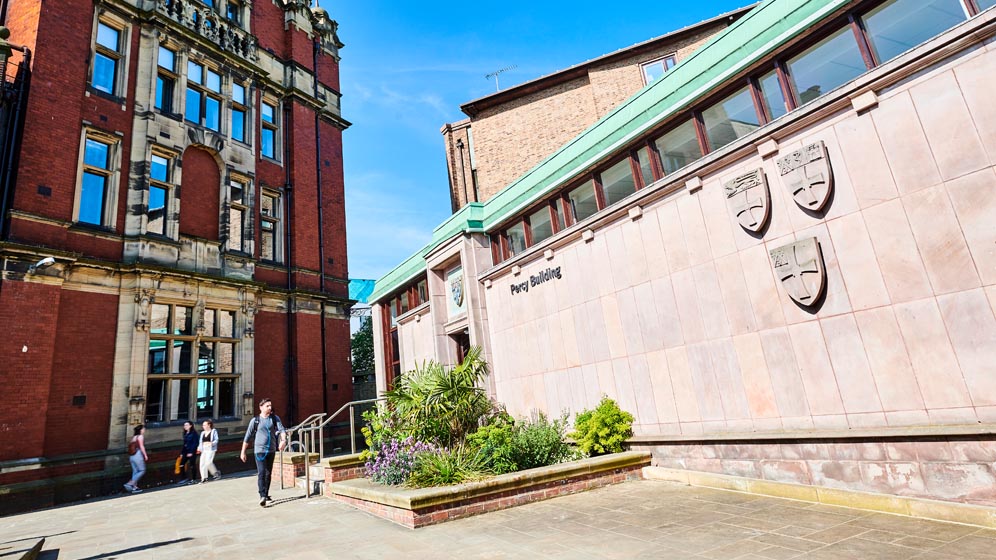Linguistics with German BA Honours
- UCAS code: Q1R2
- Full time
- 4 years
Explore how language works, how it's structured and how we communicate. Alongside linguistics, you'll build on your German language skills and have the chance to immerse yourself in German culture.
You are currently viewing course information for entry year: 2026
Next start date:
- September 2026
UCAS Institution name and code:
- NEWC / N21
Course overview
This four-year Linguistics with German degree concentrates on developing your understanding of:
- how languages function
- how we communicate
- the growth of language in the mind
Explore linguistics in the context of English and German and build a firm foundation of skills to pursue many potential career paths. You'll focus on the structure, history, and social aspects of English, German, and language in general.
In your third year, you'll immerse yourself in German culture as you spend the year in Germany. Improve your language skills, boost your confidence and gain a first-hand appreciation of the language in context.
Our cutting-edge programme is shaped by the research specialisms of our world-leading researchers. Your studies explore the latest ideas and most exciting areas of linguistics, such as:
- first and second language acquisition
- child language acquisition
- language variation and change
- psycholinguistics
- theoretical linguistics
Your course and study experience - disclaimers and terms and conditions
Please rest assured we make all reasonable efforts to provide you with the programmes, services and facilities described. However, it may be necessary to make changes due to significant disruption, for example in response to Covid-19.
View our Academic experience page, which gives information about your Newcastle University study experience for the academic year 2025-26.
See our terms and conditions and student complaints information, which gives details of circumstances that may lead to changes to programmes, modules or University services.
Quality and ranking
Professional accreditation and recognition
All professional accreditations are reviewed regularly by their professional body.
Modules and learning
Modules
The information below is intended to provide an example of what you will study.
Most degrees are divided into stages. Each stage lasts for one academic year, and you'll complete modules totalling 120 credits by the end of each stage.
Our teaching is informed by research. Course content may change periodically to reflect developments in the discipline, the requirements of external bodies and partners, and student feedback.
Optional module availability
Student demand for optional modules may affect availability.
Full details of the modules on offer will be published through the Programme Regulations and Specifications ahead of each academic year. This usually happens in May.
To find out more please see our terms and conditions
The linguistics topics you study are broadly similar to our Single Honours Linguistics degree.
Your stage 1 modules will lay the foundation for in-depth analysis and description of language. They focus on topics such as the structure of words and sentences (morphology and syntax), the sounds and sound systems of language (phonetics and phonology) and language variation and change.
Your language tuition involves two hours a week on speaking, reading, writing and listening skills.
You'll also have a weekly one-hour German grammar lesson. You complement this with classes aimed at helping you understand the culture and society of the countries where German is spoken.
Modules
| Optional Modules | Credits |
|---|---|
| Introduction to German history, culture and society | 20 |
| Introduction to Linguistics | 20 |
| Academic Study and Research Skills | 0 |
The linguistics topics you study at stage 2 are broadly similar to our Single Honours Linguistics degree.
You will develop your knowledge of core aspects of grammar and sound patterns and how these apply to a range of languages. You'll broaden your understanding of language study by exploring the social context in which languages are learned, used and developed over time.
In your German modules in the School of Modern Languages, you’ll develop your reading, listening, writing and speaking skills. You’ll also develop your understanding of the culture and society of German-speaking countries, in preparation for your year abroad.
In addition, you can take modules in beginners' Dutch.
Modules
| Compulsory Modules | Credits |
|---|---|
| Level C (HE Advanced) German | 20 |
| Phonological Theory | 20 |
| Syntactic Theory | 20 |
| Year Abroad Preparation | 0 |
You will spend your third year studying or working in a German-speaking country.
Modules
| Compulsory Modules | Credits |
|---|---|
| Year Abroad Tutor Posts | 100 |
Optional Modules
Study Abroad (20 credits)
Year Abroad Work Placement Report (Semester 1) (20 credits)
Year Abroad Work Placement Report (Semester 2) (20 credits)
Year Abroad Project (Semester 2) (20 credits)
You'll continue to study advanced language modules in German, reflecting the fluency you will have gained during your year abroad.
You will develop your own interests by choosing from topics linked to your lecturers' research specialisms. These include syntactic and phonological theory, second language acquisition, language origins and evolution, child language acquisition and language change.
You will also start an independent project. During this project you'll lead your own research in close collaboration with a faculty supervisor.
Modules
| Compulsory Modules | Credits |
|---|---|
| Level D (HE Further Advanced): German for Professional and Academic Purposes | 20 |
You will also choose one of the following three modules:
| Module | Credits |
|---|---|
| Short-form Dissertation 1: English Language and Linguistics | 20 |
| Short-form Dissertation 2: English Language and Linguistics | 20 |
| Dissertation/T&I Project | 20 |
We base these figures and graphs on the most up-to-date information available to us. They are based on the modules chosen by our students in 2024-25.
Teaching time is made up of:
- scheduled learning and teaching activities. These are timetabled activities with a member of staff present.
- structured guided learning. These are activities developed by staff to support engagement with module learning. Students or groups of students undertake these activities without direct staff participation or supervision
Teaching and assessment
Teaching methods
You can normally expect to spend around 10 hours per week engaging in lecture, seminar and workshop materials, plus weekly study groups.
You also spend around 25 hours per week on class preparation, reading, writing, and other kinds of independent research recommended by your tutor.
Your specific assessments will depend on the modules you take – we assess our students’ progress using a variety of methods which go beyond the typical essay.
Assessment methods
You'll be assessed through a combination of:
-
Coursework
-
Dissertation or research project
-
Essays
-
Examinations – practical or online
-
Group work
-
Interviews
-
Presentations
-
Projects
-
Reflective report/journal
Skills and experience
Practical experience
Studying Linguistics at Newcastle means you will benefit from access to our state-of-the-art Linguistics Laboratory. The LingLab hosts collections of English language data for analysis of linguistic variation and change. It also hosts a range of equipment for advanced articulatory, phonetic and psycholinguistic research. Activities are supported by a dedicated lab manager.
You'll also have access to the award-winning Language Resource Centre in the School of Modern Languages. These facilities support your language learning, and encourage cross-cultural communication.
Research skills
As part of your degree, you will complete an independent research project in your final year. You will collaborate with a faculty member to investigate a novel topic that you are passionate about. You will also be offered a range of opportunities to participate in staff research projects.
Opportunities
You will spend the third year of your degree in a German-speaking country, where you can:
- study at one of our partner institutions
- teach English as a foreign language under the British Council assistantship programme
- take a work placement
- combine study with work placement
Our current partner institutions in Germany and Austria include:
- Karl-Franzens-Universitat Graz
- Eberhard Karls Universität Tübingen
- Martin Luther Universität Halle Wittenberg
- Ruhr-Universität Bochum
- Universität Augsburg
- Universität Rostock
- University of Oldenburg
Facilities and environment
Facilities
You'll be based in the School of English Literature, Language and Linguistics. The School is located in the Percy Building, which is at the heart of our city-centre campus. You'll join a lively community of students, academics, writers, and professionals.
You'll have access to:
- a library of 1.4 million books and 54,000 journals on 26km of shelving
- the Percy Building’s student common rooms, study areas and café
- Northern Stage, Great North Museum & the Hatton Gallery for events and exhibitions
- the Students' Union for shops, societies and gigs
- a digital media lab for developing documentaries and film-making
- the School of Modern Languages’ Language Resource Centre
You'll also have access to a diverse programme of events, including spoken-word events and creative writing courses.
Find out more about the School of English Literature, Language and Linguistics
Support
You'll have the support of an academic member of staff as a Personal Tutor throughout your degree to help with academic and personal issues affecting your academic progress.
Peer Mentors will help you in your first year. They are fellow students who can help you settle in and answer questions you may have when starting university.
Your future
English Language and Linguistics students acquire a range of valuable skills which equip them to pursue diverse career paths.
Your training can be used in:
- teaching English as a foreign language
- publishing
- journalism
- advertising, branding and marketing
- information services and data science
You will gain skills such as critical reasoning and problem solving, project and data management, oral and written communication, collaboration and independent research.
Our degrees provide excellent preparation for a wide number of professions. With further training, our graduates have also become:
- lexicographers
- translators and interpreters
- speech and language therapists
- social researchers
- legal sector workers (including forensic linguists)
Employability
Employability and the engagement with the wider world go hand-in-hand in this degree.
Many of our modules, particularly in your final year, model their assessments on the kind of tasks you might be employed to do:
- constructing marketing briefs
- summarising reports
- drafting website copy
- curating exhibitions
- designing experiments
- coding websites
- analysing data
- writing a clear and persuasive argument.
Beyond our modules, there are plenty of extracurricular opportunities. These range from freelance work for Newcastle’s student newspaper to paid internships in the department. In particular, the Newcastle Centre for Literary Arts hires students to work on everything from event management to app design.
Make a difference
Sorry, you need JavaScript to view this video
Careers support
Our Careers Service is one of the largest and best in the country, and we have strong links with employers. We provide an extensive range of opportunities to all students through our ncl+ initiative.
Visit our Careers Service website
Recognition of professional qualifications outside of the UK
If you’re studying an accredited degree and thinking about working in Europe after you graduate, the best place to find current information is the UK Government’s guidance on recognition of UK professional qualifications in EU member states. This official resource explains whether your profession is regulated in another country, what steps you need to take, and which organisation you should contact.
Entry requirements
All candidates are considered on an individual basis and we accept a broad range of qualifications.
The entrance requirements and offers below apply to 2026 entry.
| A-Level | |
|---|---|
| International Baccalaureate | |
|---|---|
Other UK and the Republic of Ireland qualifications
Alternative offers at Newcastle
Through one of our contextual or alternative offer routes, you could receive an offer of up to three grades lower than the typical requirements.
Contextual offers
We use certain contextual data from your UCAS form, alongside your application, to consider challenges that you may have faced in your education and the potential effect this may have had on your qualifications. This means you may be eligible to receive a lower contextual offer.
PARTNERS offers
One of the largest and longest support entry routes to university of its kind for students from underrepresented backgrounds. We support applicants from application through to study.
Realising Opportunities offers
A unique programme delivered in collaboration with 10 leading, research-intensive universities in the UK. The programme is open to students in Year 12/first year of college.
Pathways to Newcastle offers
Pathways to Newcastle, our national skills entry route, is available for specific subject areas.
High Performance Athletes
We support promising athletes at the application stage, who compete in regional, national or international levels in their sport.
Qualifications from outside the UK
English Language requirements
Entrance courses (INTO)
International Pathway courses are specialist programmes designed for international students who want to study in the UK. We provide a range of study options for international students in partnership with INTO.
These courses are specifically designed for international students who want to study in the UK and progress onto one of our undergraduate degrees. Our International Study Centre, has a range of study options including:
- International Foundation
- International Year One
- English Language courses
Find out more about International Pathway courses
Admissions policy
This policy applies to all undergraduate and postgraduate admissions at Newcastle University. It is intended to provide information about our admissions policies and procedures to applicants and potential applicants, to their advisors and family members, and to staff of the University.
University Admissions Policy and related policies and procedures
Credit transfer and Recognition of Prior Learning
Recognition of Prior Learning (RPL) can allow you to convert existing relevant university-level knowledge, skills and experience into credits towards a qualification. Find out more about the RPL policy which may apply to this course.
Tuition fees and scholarships
Tuition fees for academic year 2026-2027
The 2026 entry home fees have not yet been confirmed.
| Qualification: BA Honours | |
|---|---|
|
Home students full time 4 years |
Tuition fees (Year 1)
Not set |
|
International students full time 4 years |
Tuition fees (Year 1)
24,500 |
Year abroad and additional costs
For programmes where you can spend a year on a work placement or studying abroad, you will receive a significant fee reduction for that year.
Some of our degrees involve additional costs which are not covered by your tuition fees.
Scholarships
Find out more about:
Open days and events
You'll have a number of opportunities to meet us throughout the year at our on-campus and virtual open days.
You'll be able to:
- explore our beautiful campus
- find out about our vibrant city
- discover what students think about studying at Newcastle
You'll also have the opportunity to speak to academic staff and find out more about the subjects you're interested in.
Find out about how you can visit Newcastle in person and virtually.
We regularly travel overseas to meet with students interested in studying at Newcastle University. Visit our events calendar to find out when we're visiting your region.
How to apply
Apply through UCAS
To apply for undergraduate study at Newcastle University, you must use the online application system managed by the Universities and Colleges Admissions Service (UCAS). All UK schools and colleges, and a small number of EU and international establishments, are registered with UCAS. You will need:
- the UCAS name and institution codes for Newcastle University (NEWC/N21)
- the UCAS code for the course you want to apply for
- the UCAS 'buzzword' for your school or college
If you are applying independently, or are applying from a school or college which is not registered to manage applications, you will still use the Apply system. You will not need a buzzword.
Apply through UCASApply through an agent
International students often apply to us through an agent. Have a look at our recommended agents and get in touch with them.
Get in touch
By phone
Call us on +44 (0) 191 208 3333 and press option 1. Our opening hours are Monday to Friday 10am until 4pm.
Live chat
Our NCL chatbot might be able to give you an answer straight away. If not, it’ll direct you to someone who can help.
You'll find our NCL chatbot in the bottom right of this page.
Online
Keep updated
We regularly send email updates and extra information about the University.
Receive regular updates by email












